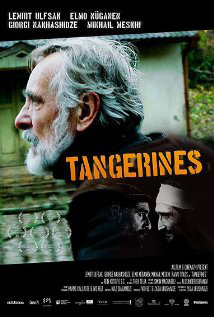Tangerines is a film that skillfully satirizes war by focusing on a very small slice of the 1992 civil war between Georgia and Abkhazian separatists that killed 15,000 people and displaced 250,000 more. Even as most of the civilians in their area fled, two Estonian farmers have stayed behind to harvest their tangerines, as the war approaches. After a brief firefight near their orchard, the Estonians discover two badly wounded men – one is Georgian, the other is a Chechen mercenary fighting for the separatists. The Estonians take them in to help them recover, but as soon as each soldier is strong enough to sit up and talk they vow to kill each other. Ivo, the older and wiser of the two Estonians, intervenes to stop these two men attacking each other in his house, and gradually he leads them away from their violent animosity to each other.
Director and screenwriter Zaza Urushadze deftly contrasts the Estonians’ steadfast concern for their bumper tangerine harvest which has significant monetary value, with the Georgian and the Chechen soldiers’ destructive and worthless pursuit of war, which leads only to death. Veteran Estonian actor Lembit Ulfsak, who plays the farmer Ivo, remains calm and dispassionate throughout, never allowing his character to give in to his emotions or his fears. The war visits these four men once again at the end of the film, with predictably bloody consequences, but this time the characters who survive come to a realization of the pointlessness of the conflict, and for the first time in the film Urushadze allows the camera to pull back and show a wide shot of the Chechen mercenary driving over a mountain road into beautiful countryside and – we infer – into a wider, more forgiving world.
In a question and answer session after the screening, the Georgian Urushadze and his producer, Ivo Felt, who is Estonian, said they didn’t intend to make a war movie, but only used the war as a backdrop for a film about the psychology of their four characters and how the two combatants evolved from animosity to acceptance of each other. “It is about how a character can transform himself,” said Felt. And with masterful performances by their four main actors who steer clear of sentimentality, the filmmakers’ critique of war is all the more convincing.

